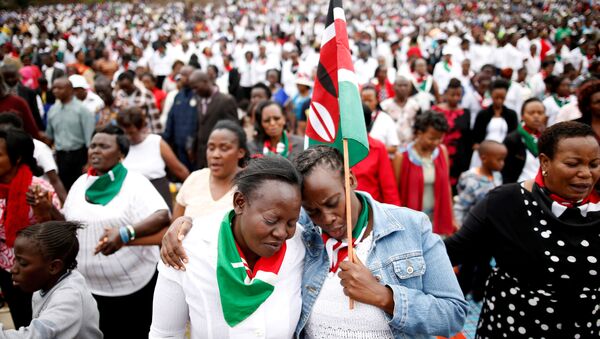The incumbent President Uhuru Kenyatta is keen to win. According to one source, Kenyatta doesn't want to make history by becoming the first president not to be re-elected.
His stands against 72-year-old Raila Odinga, who knows that this may be the last time he gets to run for the prestigious leadership position.
Whatever the outcome, the stage is certainly set for an event that will showcase Kenya to the Horn of Africa, but also internationally.
With just a few days left before Kenyans hit the polls, fears that there will be electoral violence have already increased in the country.
On July 29, the lifeless body of Chris Msando, the head of information, communication and technology at the Independent Electoral and Boundaries Commission (IEBC), which oversees the polls, was found just outside of Nairobi.
Who do you think will win Kenya's August 8th presidential election?
— Ken Opalo (@kopalo) 26 June 2017
This recent development has led some Kenyans to expect violence once the election results are in.
Murithi Mutiga, senior Kenya analyst with the International Crisis Group, said that the Kenyan elections are not only important for Kenyans and the continent, but they are vital for the world, and any post-election violence may put the country in a difficult position.
According to the International Monetary Fund (IMF), Nairobi in Kenya is the second largest economy in East Africa. The city also has a strong stock market, so a smooth election is vital if Kenya is to maintain its strong economic position among its global companions.
"I think the Kenya election deserves a lot of attention from an economic standpoint, as a smooth and stable outcome is important partly because the Kenyan economy is extremely globally interconnected. It's one of the most diversified economies in the region, and it's not dependent on natural resources. You have industries which are very sensitive to disruption, for example, tourism. You have many technological firms that have chosen to set up base in Nairobi, the financial services sector is important, and all these industries can be gravely affected in the event of a violent election," Mr. Mutiga told Sputnik.
All you need to know ahead of Kenya's bitterly fought elections by @mutigam and @CrisisGroup https://t.co/ABy9TTIJ2p
— Elissa Jobson (@ElissaJobson) 2 August 2017
The election stakes are "unfortunately" high, according to Mr. Mutiga. Behind the scenes experts and analysts are pleading with diplomats and others, that have influence over Kenyatta and Odinga, to encourage them to avoid a contentious election and openly pledge support for the outcome of the vote, whilst challenging an unwanted result through the courts, not the streets.
For East Africa, this election will hopefully solidify Kenya's position on the international stage.
"This is a very important election, partly because Kenya is one of the most open countries in Africa. There have been many debates about what the best form of government is in this part of the world. Kenya has a more open and relatively liberal system, so Kenya is seen as an example in a region where there is a tendency to have more authoritarian leaders. Kenya is one of the few countries in the world where you go into an election and you do not know who will win unlike some of the other more closed societies, so it's very important because Kenya is closely watched across the continent and beyond," Mr. Mutiga told Sputnik.
From a peace and humanitarian point of view, Kenya has deployed over 3,600 soldiers to Somalia to help fight the militant group al-Shabaab. There are fears however, that if the opposition party gets in, this will stop, as Odinga has said they will withdraw troops from the region.
"The question of the deployment of Kenyan troops in Somalia is one of the issues of clear difference in policy approaches between the incumbent president and the opposition party.
"The opposition has declared that they would pull troops out of Somalia, I don't think that they would do it in a precipitative fashion that would cause a crisis. I think if they won, they would be under pressure to keep that pledge, but I don't know if they would go ahead with it as we have seen that the Trump administration favors escalatory military action in Somalia, and Kenya is an important ally of the US," Mr. Mutiga said.
"So we don't know whether they would engage in a precipitative pull-out. But what affect that would have on Somalia is a good question. We don't know," Mr. Mutiga concluded.



